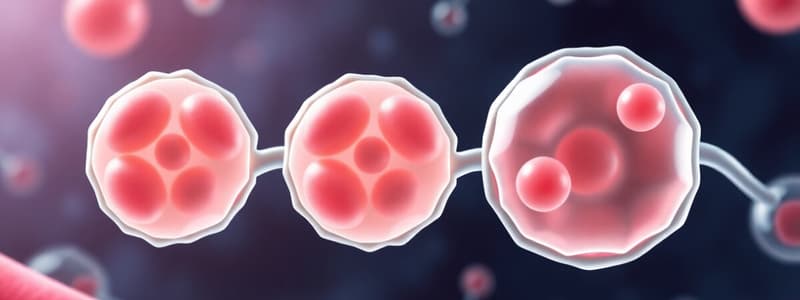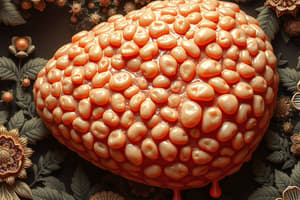Podcast
Questions and Answers
What is the primary function of lipolysis?
What is the primary function of lipolysis?
- Stimulating glucose uptake in muscle tissue
- Transporting fatty acids into cells
- Breaking down triglycerides into glycerol and free fatty acids (correct)
- Producing ketone bodies from acetyl-CoA
Which hormone is primarily responsible for stimulating lipolysis?
Which hormone is primarily responsible for stimulating lipolysis?
- Cortisol
- Insulin
- Testosterone
- Glucagon (correct)
In what process are free fatty acids converted into ketone bodies?
In what process are free fatty acids converted into ketone bodies?
- Ketogenesis (correct)
- Gluconeogenesis
- Fatty acid oxidation
- Lipogenesis
Which of the following provides the highest energy yield per gram?
Which of the following provides the highest energy yield per gram?
What effect does insulin have on fat metabolism?
What effect does insulin have on fat metabolism?
How does carbohydrate intake affect fat metabolism?
How does carbohydrate intake affect fat metabolism?
What is the primary storage form of excess fatty acids in the body?
What is the primary storage form of excess fatty acids in the body?
Which condition is characterized by insulin resistance and altered fat metabolism?
Which condition is characterized by insulin resistance and altered fat metabolism?
Flashcards are hidden until you start studying
Study Notes
Overview of Fat Metabolism
- Fat metabolism refers to the biochemical processes involved in the breakdown and utilization of fats (lipids) for energy.
- The primary types of fats involved are triglycerides, phospholipids, and cholesterol.
Key Concepts
-
Lipolysis
- The process of breaking down triglycerides into glycerol and free fatty acids.
- Triggered by hormones like glucagon and epinephrine.
-
Fatty Acid Oxidation
- Free fatty acids are transported into the mitochondria.
- Undergo beta-oxidation, producing acetyl-CoA, NADH, and FADH2.
- Acetyl-CoA enters the Krebs cycle for energy production.
-
Ketogenesis
- Occurs in the liver when glucose availability is low.
- Acetyl-CoA is converted into ketone bodies (acetoacetate, beta-hydroxybutyrate).
- Ketone bodies can be used as an alternative energy source by many tissues.
-
Fat Storage
- Excess fatty acids are stored as triglycerides in adipose tissue.
- Fat storage is stimulated by insulin and inhibited by glucagon.
-
Energy Yield
- Fat metabolism provides a high energy yield (approximately 9 kcal/g).
- More energy-dense than carbohydrates (4 kcal/g) and proteins (4 kcal/g).
Regulation of Fat Metabolism
-
Hormonal Regulation
- Insulin: Promotes fat storage and inhibits lipolysis.
- Glucagon: Stimulates lipolysis and fatty acid oxidation.
- Epinephrine: Activates lipolysis during stress or exercise.
-
Nutritional Factors
- Carbohydrate intake influences fat metabolism; low carb diets can increase fat oxidation and ketogenesis.
- The type of dietary fats (saturated vs. unsaturated) affects metabolic processes.
Clinical Relevance
- Disorders of fat metabolism can lead to obesity, diabetes, and cardiovascular diseases.
- Metabolic syndrome is characterized by insulin resistance and altered fat metabolism.
Summary
- Fat metabolism is crucial for energy production, especially during periods of fasting or intense exercise.
- Understanding the biochemical pathways and regulation mechanisms can inform dietary choices and clinical interventions.
Overview of Fat Metabolism
- Biochemical processes of fat breakdown and utilization for energy.
- Main fats involved: triglycerides, phospholipids, cholesterol.
Key Concepts
-
Lipolysis
- Breaks down triglycerides into glycerol and free fatty acids.
- Hormonal triggers include glucagon and epinephrine.
-
Fatty Acid Oxidation
- Free fatty acids enter mitochondria.
- Undergo beta-oxidation to produce acetyl-CoA, NADH, and FADH2.
- Acetyl-CoA feeds into the Krebs cycle for energy production.
-
Ketogenesis
- Occurs in liver when glucose levels are low.
- Converts acetyl-CoA into ketone bodies (acetoacetate, beta-hydroxybutyrate).
- Ketone bodies serve as alternative energy sources for various tissues.
-
Fat Storage
- Excess fatty acids stored as triglycerides in adipose tissue.
- Insulin stimulates fat storage; glucagon inhibits it.
-
Energy Yield
- High energy yield from fat metabolism: approximately 9 kcal/g.
- More energy-dense compared to carbohydrates (4 kcal/g) and proteins (4 kcal/g).
Regulation of Fat Metabolism
-
Hormonal Regulation
- Insulin promotes fat storage and inhibits lipolysis.
- Glucagon stimulates lipolysis and fatty acid oxidation.
- Epinephrine activates lipolysis during stress or exercise.
-
Nutritional Factors
- Carbohydrate intake affects fat metabolism; low carb diets enhance fat oxidation and ketogenesis.
- Dietary fat types (saturated vs unsaturated) influence metabolic pathways.
Clinical Relevance
- Disorders in fat metabolism can lead to obesity, diabetes, and cardiovascular diseases.
- Metabolic syndrome characterized by insulin resistance and abnormal fat metabolism is a significant health concern.
Summary
- Fat metabolism is vital for energy, particularly in fasting or intense exercise.
- Knowledge of biochemical pathways and regulatory mechanisms aids in dietary choices and clinical practices.
Studying That Suits You
Use AI to generate personalized quizzes and flashcards to suit your learning preferences.




